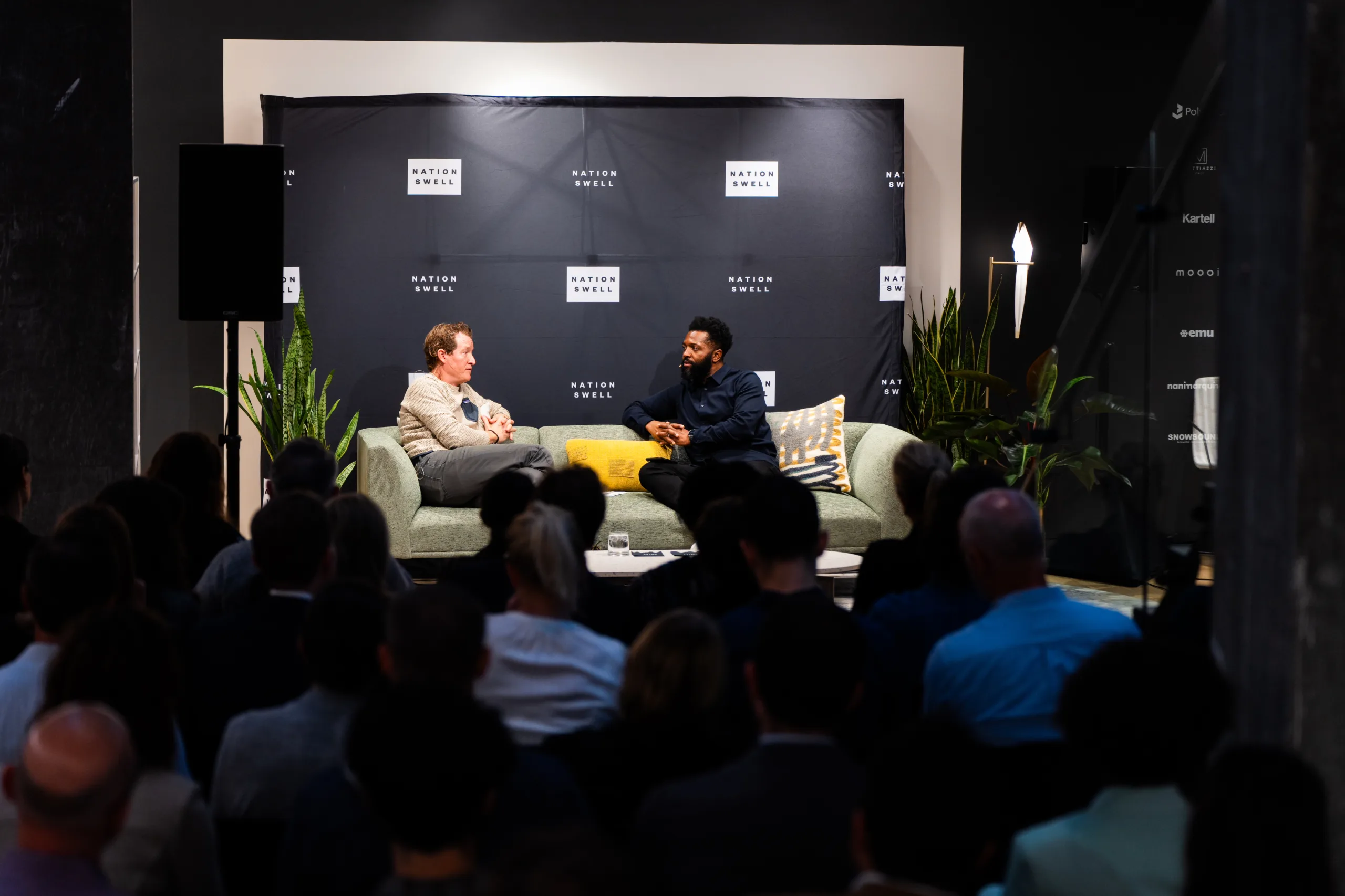In the fall of 2022, Patagonia founder Yvon Chouinard announced a bold new experiment in for-profit business: the voting stock of his company would immediately transfer to the Patagonia Purpose Trust, with the remaining non-voting stock diverted to the Holdfast Collective, a 501c4 nonprofit, to ensure that all money not reinvested back into the company is dedicated to addressing the climate and ecological crisis. “Earth,” he proclaimed in a now-viral open letter, “is now our only shareholder.”
On September 18, 2023, as leaders from across sectors descended upon New York City for Climate Week, Patagonia CEO Ryan Gellert joined NationSwell for an in-person fireside chat to unpack how the company is maintaining its commitment to being a purpose-driven business. Moderated by best-selling writer, podcaster, and NationSwell Council member Baratunde Thurston, the conversation explored how for-profit companies can pave the way forward on catalyzing bold climate action and what leaders can do to ensure that their personal and corporate values are in sync.
Here are several highlights from the discussion:
Climate work is a lifelong commitment, and protecting the planet is our shared responsibility.
According to Gellert, too many CEOs would respond to climate conversations five years ago with the common refrain: “That’s not my problem.” Today, he says the tone of those conversations has shifted encouragingly, and those same leaders are now more likely to acknowledge their place in finding shared solutions — even when they aren’t sure of the best way forward.
The future of climate will necessarily depend on more people — those in positions of power in particular — acknowledging their role in moving the ball down the field and making sure that climate work is “a 52-week thing,” and not just something to focus on one week out of the year.
Business sector leaders have an obligation to be the catalysts of change — but they can’t do it alone.
Since Patagonia shifted its ownership structure, Gellert shared that there have been many conversations with other companies interested in investing in purpose in a similar way — and that it feels like the guardrails have meaningfully shifted in terms of what’s possible in rethinking a business’s relationship to its employees, its community, and the planet.
“I believe the biggest impact Patagnoia has had has been modeling a different way of business,” he said.
And while catalyzing businesses to drive change will be of critical importance to the larger climate movement, the business sector won’t succeed on its own.
“I’d like to create a world where everybody understands it absolutely is our shared problem… and we’re all leaning in the same direction, from the business sector, with the government, with NGOs, with citizens, to clean up the mess we’ve created,” Gellert said.
For purpose-driven businesses to succeed, purpose and profits cannot be treated as distinct aims.
The days of businesses setting up a corporate social responsibility department and making impact work solely that group’s jurisdiction are over. In order for businesses to fully realize their role in creating a more sustainable, equitable future, Gellert said, they must necessarily make it their responsibility to create a culture where every person in every area feels incentivized to show up and do the work.
“I don’t think you can separate purpose and profits, period,” he said. “Under pressure, every single business gravitates toward profits. So the two have to be entirely connected, or you have to call it what it is.”
Acknowledging that it had created an “incomplete culture” was instrumental in helping Patagonia to hone its approach to social issues.
In the weeks after George Floyd’s murder, Patagonia, like many other companies, took a hard look at its internal culture and where it fell short of its values. What Gellert and other leaders leaned into during that moment was a commitment to “transformational change even where there’s no end in sight” — and on improving systems and processes in ways that relied more on common sense than external optics and politics.
“Listen, show up, and do the work,” Gellert said. “And I think slowly and steadily, that’s given us the momentum to do the work internally and externally.”
Consumerism and “business-as-usual” have created many of the problems we currently face, and need to be interrogated.
According to Gellert, we’ve outgrown the Milton Friedman-backed idea of shareholder primacy — it’s precisely business as usual that has created the environmental crisis we currently find ourselves mired in.
Universities and business schools have a vital role to play in helping to build thinking, morals, practices, and systems that address how consumerism contributes to natural resource depletion, pollution, and other deleterious climate impacts. Businesses, meanwhile, must interrogate how circular business models can help shrink their environmental impact and deliver value to a new set of stakeholders — including customers, employees, and the planet.
Sometimes the best way into climate awareness isn’t doom forecasting or even direct action — it’s connection.
In response to an audience question about the best way to help children connect with the complicated and dire implications of the climate crisis, moderator Baratunde Thurston said that sometimes, the best way into climate awareness, “…isn’t always direct work and action, (but) climate connection — to highlight our relationship to nature in a beautiful, local way.”
“Kids are naturally curious, they play with bugs, they splash in the water… we don’t need forecasts of doom and gloom, we can achieve the same purpose through a celebration or an exploration of that connection,” he said. “When we become more interconnected, saving the planet becomes the most selfish thing we can do — it becomes about saving ourselves. And if we can plant that seed early with kids without being heavy-handed with it, then that could do something amazing.”




